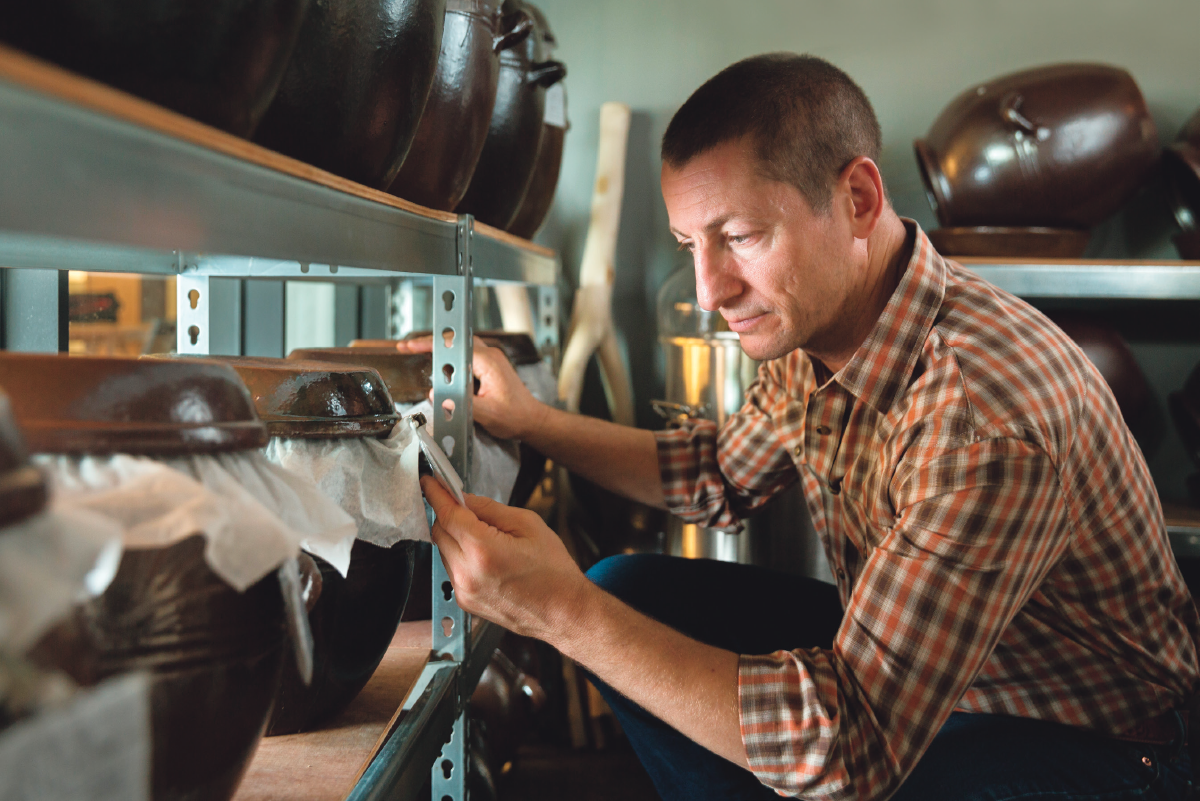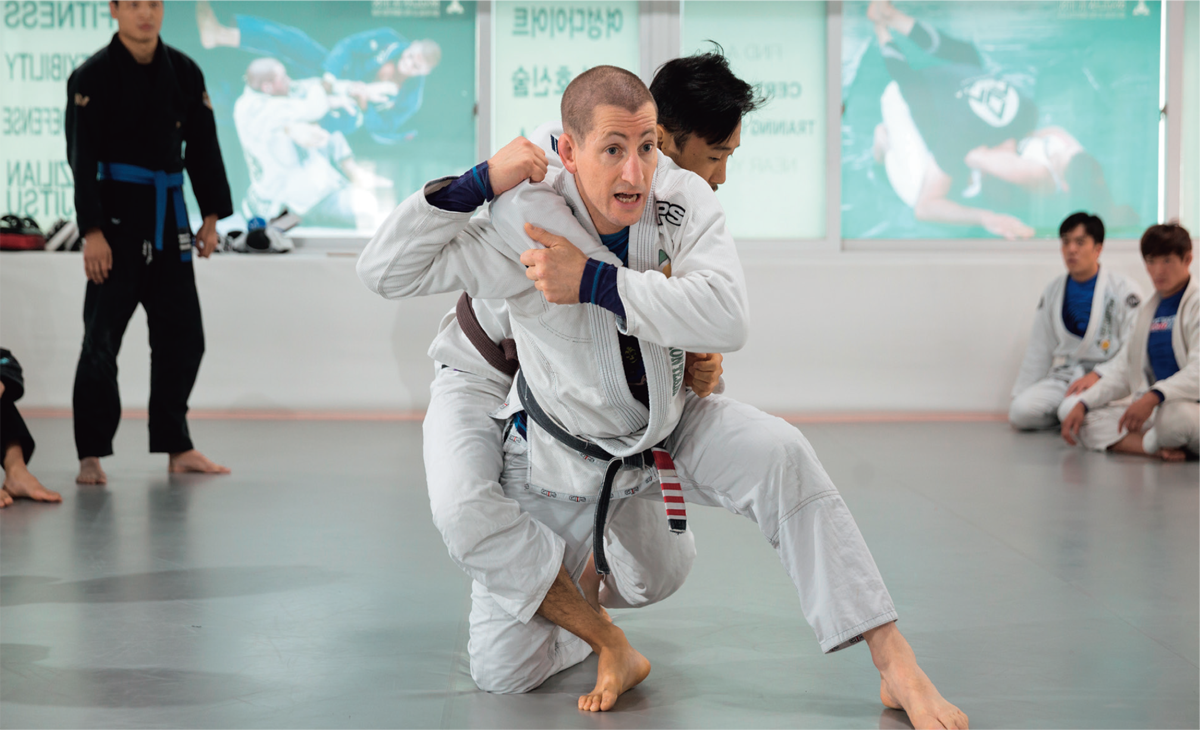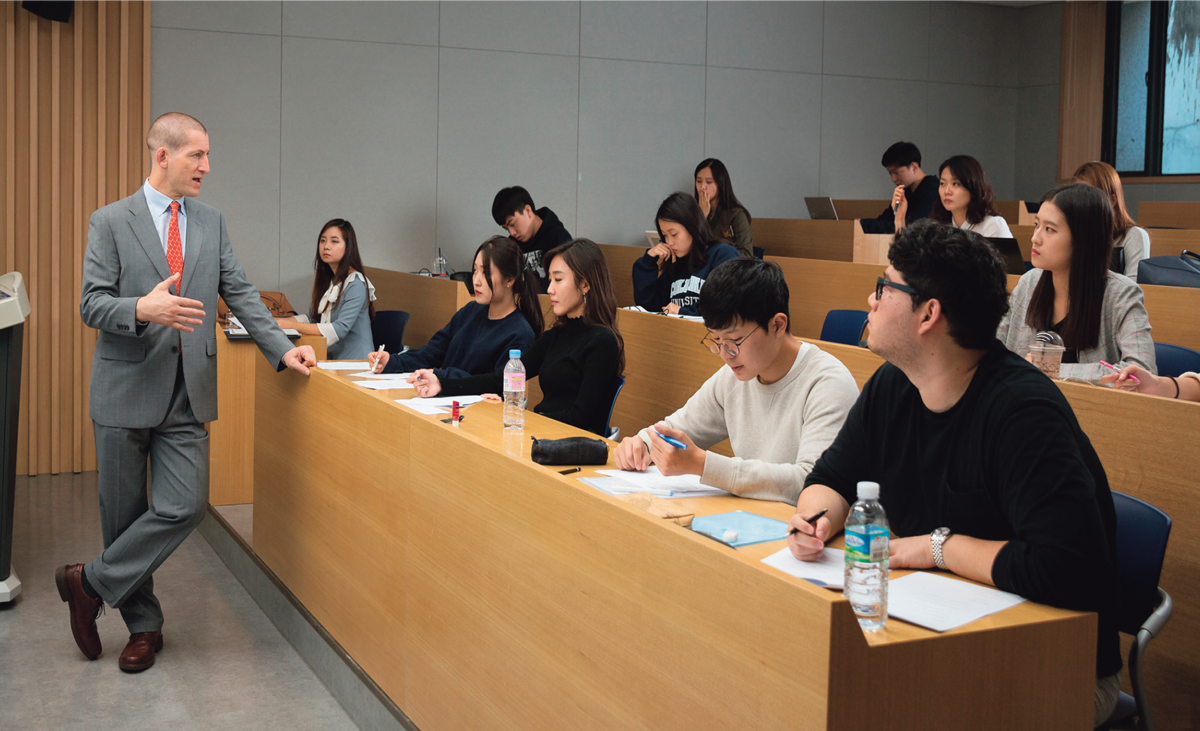This American is better versed in two Korean traditions — literature and liquors — than many Koreans. One can become an expert in a foreign country’s culture without necessarily loving it. With John Frankl, that does not seem to be the case. Otherwise, he would not bemoan Korea’s “Americanization” amid his earnest efforts to preserve and develop its traditions.

Professor John Frankl checks crocks containing his self-made liquors. He enjoys the cumbersome process of homebrewing traditional Korean wine and the unique taste of the results.
Since ancient times, Koreans have believed that both literary and martial arts proficiency is needed to become a complete person. Some people don’t seem to be content with these two requisites and add another: taste. John Frankl appears to meet all three requirements.
Frankl is a professor with a decade’s experience of teaching Korean literature at Yonsei University’s Underwood International College. That’s not all. Look for him in an Internet search engine and you will see his name affiliated with dozens of Brazilian jiu-jitsu (BJJ) academies in Korea; he is well-known in the martial arts community.
As for taste, there is alcohol. Koreans are famous — or infamous — consumers. However, Frankl has few peers in his love and knowledge about their traditional wines. He even receives offers to produce and sell alcoholic beverages under his own name brand.
How does he immerse himself in three completely different realms without being a nerd, a fighter, or a drunkard? Balance and moderation seem to be the keywords.
Frankl is familiar with the saying, “Jack of all trades but master of none,” but if it is used to describe him, he would be nonplussed. “I don’t like to be a gold medalist in one event but a bronze medalist in three,” he says. More specifically, a pair of threes. Frankl wants to do well as a professor, husband and father, as well as a man of letters, athlete and brewer. “To become the best in one thing, you have to give up too many others,” he says.
Juggling Three Balls
Take Brazilian jiu-jitsu as an example. In 1999, Frankl all but introduced the sport — a derivative of Japanese judo — to Korea. His first black belt students have since opened BJJ academies, and their students, in turn, have earned black belts and launched their own academies. The academies use Frankl’s name to highlight their link to him, but Frankl is emphatic about not being involved in their operations or accepting money from them. And he shows no interest in creating his own network of BJJ academies. He merely practices at two BJJ gyms near his workplace, not bent on competing for any titles either.
Frankl believes BJJ is the best martial art for health, superior to karate, Muay Thai and taekwondo, all of which he once practiced. “These stand-up martial arts mainly using punching and kicking leave injuries not just to defenders but attackers,” he says. “In ground-based BJJ, in contrast, you can always express an intention to surrender by tabbing your opponent, suffering no injury.” Had jiu-jitsu been a little less safe, he would not have allowed his 11th-grade daughter to learn it.
It seems engaging in contrasting careers as an academic- cum-athlete could undermine the completion of either, or both. Frankl views it differently: “To me, it is all about balance — balancing the mental and the physical. I see the two as reinforcing rather than detracting each other.” The balancing act does not leave him time to turn BJJ into his own business, nor is he interested in doing so.
Korean Wines and Liquors
Frankl’s motto of balance and moderation obviously applies, too, when he concocts his own alcoholic beverages. In 2010, he began to distill liquor at his home. Wanting to create tastier sul (alcoholic beverages), Frankl enrolled in elementary to advanced courses at the Korea Homebrewing Research Institute, among other similar institutions.
“Once you begin to make your own liquor, you can hardly drink those sold in the market,” he says. “I can hardly understand why Koreans, who have such a wonderful tradition of excellent wines and liquors, remain content with the cheap distilled spirit, soju, which tastes so boring and monotonous.”
For Frankl, raw material determines over 90 percent of the taste of home-distilled soju, and time takes care of the rest. “If you have well-fermented nuruk (malt, or fermentation starter) and quality rice, the taste of liquor is almost assured,” he says. “Put steamed rice, malt and water into a jar and let them ferment at room temperature for about 10 days or so, and you get a drink that does not exist anywhere in the world. Add seasonal flavors such as pine pollen or mugwort — it is the icing on the cake.”
Well-fermented wine is filtered to produce clear rice wine called cheongju, while the unfiltered, milky-colored wine is takju, also known as makgeolli. Heated cheongju yields soju. Alcohol proof is controlled through the heating temperature, raising it up to 80 proof (40 Korean degrees) or even higher. “Distill well-refined cheongju, and you can get about a quarter of it as soju,” Frankl says. “Traditionally distilled Korean soju is high-quality liquor that can be produced only by investing a considerable amount of time and money”

Professor Frankl, who introduced Brazilian jiu-jitsu to Korea in 1999, gives a demonstration in a studio named after him. He describes being both a scholar and athlete as a balancing act of the mind and body.
This interviewer tasted two kinds of 80-proof soju distilled by Frankl. Like other hard liquors, including Chinese kaoliang wine, the initial taste was bitter, but the aftertaste was clean, peculiar to sweet rice. The uncomfortable aftertaste that often flows back into one’s throat when drinking strong liquor was absent, too.
“Even when you drink expensive whiskey, you have to suppress the feeling that travels up the throat,” Frankl says. “Traditional Korean soju, despite its high proof, flows down to the stomach smoothly. Korean soju made from good ingredients does not give you a hangover, either, no matter how much you consume.”
Frankl claims that he can drink a night away without getting drunk if three conditions are present — good wine, good people and good atmosphere. The 51-year-old professor says he does not tolerate violent behavior caused by drunkenness. “Koreans seem to be tolerant of drunken people and their mistakes, saying ‘it is all because of sul,’” he says. “I disagree because alcohol itself is not to blame. The problem is with the people who drink it.”
Regarding the Korean drinking culture, Frankl has noticed significant changes. “These days, Koreans drink less than specifbefore, with less time spent drinking and the atmosphere much quieter. As a drinker and brewer, I should find these changes disappointing, though,” he says with a chuckle.
Frankl notes that at first some Koreans seemed to consider him weird, a foreigner distilling native Korean liquors. Now, however, people ask him to share his products and know-how. Some foreign friends, including a Scotsman from the homeland of whiskey, are also deeply attracted to Korean soju and how it is made.
“The biggest advantage of Korean wine is that you can make it from easily acquired ingredients in a relatively short time,” Frankl says. Stressing that Korean alcoholic drinks can be better than kaoliang or sake, he says, “What Koreans need is to have pride in their products, accumulate traditions and clothe them with stories.”
Frankl points out that many Koreans are ready to spend hundreds of thousands of won for a bottle of Scotch whiskey or a million won for French wine but reluctant to pay more than a few thousand won for soju or makgeolli. Korean wines and liquors, he stresses, should not necessarily be cheap and Koreans ought to learn from Chinese people, who make and sell very expensive kaoliang liquor.
“Some graduates of the homebrewing institute operate small-scale breweries and distilleries, diversifying Korean soju and makgeolli. The differentiation process has begun although popularization will take more time,” Frankl says. “The era of cheap, weak and tasteless wines and liquors, such as soju and makgeolli that you find at supermarkets and convenience stores, should fade away to make room for vintage soju, cheongju and dongdongju (also synonymous to takju, but with a few rice grains floating).”
Frankl sometimes receives overtures to launch liquors under his name. “I am ambivalent toward the proposal,” he says. “If I begin to make liquor as a business, I may not be able to enjoy it as a hobby any longer. On the other hand, I also find myself dreaming of putting my products on the shelves of large stores.” If anything, however, Frankl feels the joy of crafting, not selling, is more important.
Engaging in contrasting careers as an academic-cum-athlete could undermine
the completion of either, or both. Frankl views it differently.

Professor Frankl teaches Korean literature at the Underwood International College at Yonsei University. He grew up in Santa Cruz, California and visited Korea for the first time in 1989 as an exchange student at the same school.
Diversity over Uniformity
John Mark Frankl was born in Los Angeles but mostly grew up in Santa Cruz, California. “There were no Korean residents or students around my town in my high school days. Nor was there a Christian missionary who had served in Korea,” he says. “Somehow, I picked Korean as a second foreign language at university and studied it very hard, as it was one of the pass-or-fail subjects to graduate.”
He first came to Korea in 1989 as an exchange student at Yonsei University and continued studying Korean. It was then that he developed his interest in modern and contemporary Korean literature. Frankl favors novelists who were active in the 1920s and ‘30s, such as Chae Man-shik, Yeom Sang-seop and Hyeon Jin-geon. They carried the literary banners of realism and naturalism, but Frankl’s preference is based on specific writers and their works, not literary genres. His favorite is Yi Sang. He likes Yi’s essays, but not his poems and novels, finding them “too esoteric” to understand.
Having lived in Korea for nearly 15 years, Frankl admits that of course he loves the country. “As you know, however, there can be no love with 100 percent purity,” he says. “If you love Korea with 95 percent of positive feelings, the other 5 percent of negative aspects can appear to stand out.” As for the reasons for his 95 percent of good feelings, Frankl explains that he finds Koreans confident and open-minded and Korea a friendly and convenient country for expats.
Regarding the negative 5 percent, Frankl cites uniformity or diminished individuality. “Whenever I visit Sinchon or Apgujeong, I can find little difference from New York or Tokyo. Koreans and their cities are losing their appeals, or unique flavors,” he says. “Yes, the world is rapidly being globalized, but I am afraid Korea has become too Americanized.”
Asked what he thinks about the national character of the Korean people, Frankl says he does not believe in the term “national trait,” and Korean teachers should not try to inject mythical terms such as “one nation” or “pure bloodline” into their students. Instead, he goes on, Koreans need to seek diversity among themselves and recognize and respect the differences of foreigners — here and abroad.
“What I like most about Korea is the broad diversity of dialects, landscapes and food for a country where you can reach almost anywhere by driving just three hours or so,” he adds.